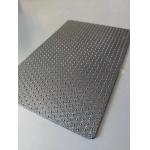Landfill Used In The Seepage Prevention And Stabilization Of
Landfill Sites To Prevent The Leakage Of Pollutants
Product Introduction
Spray Coarse Geosynthetics Membrane is a special geosynthetic
material. It is produced on the basis of the traditional production
process of polyethylene impervious membrane by updating the
production equipment, so that the surface of the produced
polyethylene impervious membrane forms a granular rough surface.
This design not only improves the friction performance of the
geomembrane surface, but also has stronger tensile strength
compared to the smooth membrane of the same specification.
Product Properties
Spray Rough Geomembrane has various performance characteristics
that make it excel in impervious engineering. Firstly, its
impermeability is highly reliable with a small permeability
coefficient, effectively preventing water seepage. Secondly, the
construction and laying are relatively easy, reducing construction
difficulty and cost. In addition, spray rough geomembrane has
strong tensile strength, elongation at break, and puncture
resistance, with stable material properties that can resist the
erosion of various chemical agents. The seams are connected by
double-seam hot welding, ensuring high seam strength and minimizing
leakage risks.
Product Application
1. Tailings pond: used in the seepage prevention and stabilization
project of tailings pond to prevent the leakage of harmful
substances.
2. Water conservancy projects: such as reservoirs, DAMS, etc., to
enhance the structure of seepage prevention and stability.
3. Slope engineering: Suitable for slopes where stability needs to
be enhanced, especially on steep or soft soils.
4. Landfill: slope anti-slip and anti-seepage for landfills to
improve the safety of the project.
Products series
Single textured geomembrane, double-wall textured
geomembrane.
Product Specification
* Thickness(mm): 0.30mm~3.00mm
* Width: 4m~8m
* Roll length: 50m~100m (customized request accept)
PS: Customized request accept for all above.
Geomembrane Series Textured HDPE Geomembrane For Landfill (GB/T 17643-2011(GH-2T1,GH-2T2)) | Serial Number | Project | Index | | Thickness(mm) | 0.75 | 1.00 | 1.25 | 1.50 | 2.00 | 2.50 | 3.00 | | 1 | Density (g/c㎡,≥) | ≥0.940 | | 2 | Textured Highth (mm) | ≥0.25 | | 3 | Yield Strength (N/mm,LD/TD) | ≥11 | ≥15 | ≥18 | ≥22 | ≥29 | ≥37 | ≥44 | | 4 | Breaking Strength (N/mm,LD/TD) | ≥8 | ≥10 | ≥13 | ≥16 | ≥21 | ≥26 | ≥32 | | 5 | Yeild Elongation Rate (%) | ≥12 | | 6 | Breaking Elongation Rate (%) | ≥100 | | 7 | Rectangular Tear Strength (N) | ≥93 | ≥125 | ≥160 | ≥190 | ≥250 | ≥315 | ≥375 | | 8 | Puncture Strength (N) | ≥200 | ≥270 | ≥335 | ≥400 | ≥535 | ≥670 | ≥800 | | 9 | Tensile Load Stress Cracking (Notch Constant Load Tensle Method) h | ≥300 | | 10 | Carbon Black Content(Rang) (%) | 2.0~3.0 | | 11 | Carbon Black Dispersion | There is not more than one grade 3 in 10 data, and grade 4 and
grade 5 are not allowed | | 12 | Oxidative Induction Time (OIT) | Standard OIT (min)≥100 | | High Pressure OIT (min)≥400 | | 13 | 85℃ thermal aging (Atmospheric Pressure OIT Retention After 90 Day) | ≥55 | | 14 | Ultraviolet Irradiation After 1600 Hours, The OIT Retention(%) | ≥50 |
|
(CJ-T234-2006) | Specification | 1.00mm | 1.25mm | 1.50mm | 2.00mm | 2.50mm | 3.00mm | Remark | | Item | | Thickness (mm) | 1.00mm | 1.25mm | 1.50mm | 2.00mm | 2.50mm | 3.00mm | | | Textured Highth (mm) | 0.25 | | | Density (g/c㎡,≥) | 0.94 | | | Tensile Properties | | Yield Strength (N/mm,LD/TD) | 15 | 18 | 22 | 29 | 37 | 44 | | | Breaking Strength (N/mm,LD/TD) | 10 | 13 | 16 | 21 | 26 | 32 | | | Yeild Elongation Rate (%) | 12 | | | Breaking Elongation Rate (%) | 100 | | | Rectangular Tear Strength (N) | 125 | 156 | 187 | 249 | 311 | 374 | | | Puncture Strength (N) | 267 | 333 | 400 | 534 | 667 | 800 | | Environmental Stress Crack Resistance (h)
(A single point of incision constant tensile method) | 300 | | | Carbon Black | | Carbon Black Content(Rang) (%) | 2.0~3.0 | | | Carbon Black Dispersion | Nine of 10 observation area should be grade 1 or grade 2, not more
than 1 of grade3 | | | Oxidative Induction Time (OIT) | | Standard OIT (min) | 100 | | | High Pressure OIT (min) | 400 | | | 85℃ Oven Ageing (Minimum Average) | | 90 days after baking, the standard OIT retention(%) | 55 | | | 90 days after baking, the hight pressure OIT retention(%) | 80 | | | The Anti-UV Strength | | Ultraviolet irradiation after 1600 hours, the standard OIT
retention(%) | 50 | | | Ultraviolet irradiation after 1600 hours, the high pressure OIT
retention(%) | 50 | | | -70℃ The Low Temperature Embrittlement Performance mpact | Pass | | | Water Vapor Penetration Coefficient g.cm (cm2.s.Pa) | ≤1.0X10-13 | | | Dimensional Stability | ±2 | |
|







